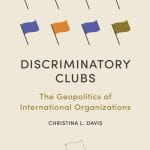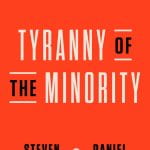- Celebrating academic excellence at the 2025 Harvard Horizons Symposium
On Tuesday, April 8th, members of the Harvard Department of Government gathered at the 2025 Harvard Horizons Symposium to support and celebrate one of our…
- Democrats wrongly assume only Trump’s words alienate Latinos
Marcel Roman, Assistant Professor of Government, has co-authored an article for The Washington Post with Amanda Sahar d’Urso, an assistant professor at Georgetown University’s Department…
- Steven Levitsky & Daniel Ziblatt publish op ed in NYT
Steven Levitsky, David Rockefeller Professor of Latin American Studies, and Daniel Ziblatt, Eaton Professor of the Science of Government, have published an op ed in the New…
- Regulating Location Incentives
Brian Highsmith Graduate Student, American Politics This forthcoming law journal article explores how the development of American antitrust law was shaped by popular concerns about…
- Persecuted Minorities and Defensive Cooperation: Contributions to Public Goods by Hindus and Muslims in Delhi
Melani Cammett Faculty, Comparative Politics How does intergroup inequality, specifically minority experiences of persecution, affect contributions to local public goods? Based on an original survey…
- Political Change and Electoral Coalitions in Western Democracies
This study by Peter Hall, Georgina Evans, and Sung In Kim documents long-term changes in the political attitudes of occupational groups, shifts in the salience…
- Discriminatory Clubs: The Geopolitics of International Organizations
Christina Davis’s new book examines the discriminatory logic at the heart of multilateralism. Overview: Member selection is one of the defining elements of social organization, imposing…
- Tyranny of the Minority
Why American democracy reached the breaking point America is undergoing a massive experiment: It is moving, in fits and starts, toward a multiracial democracy, something…
- Complementarity and Public Views on Overlapping Domestic and International Courts (with Kelebogile Zvobgo)
Stephen Chaudoin Faculty, International Relations Overview: Can international organizations (IOs) turn the tide of resistance to their authority? We consider a class of IOs bound…
- Autocracy-favoring Globalization?
George Yean Graduate Student, Comparative Politics & International Relations A working paper: What is the role of globalization for the rise of autocracies worldwide? We…
- The Election Effect: Democratic Leaders in Inter-group Conflict (with Sarah Hummel and Yon Soo Park)
Stephen Chaudoin Faculty, International Relations Overview: Many interactions between countries depend on choices made by democratically selected leaders. We argue that the experience of being…
- Uncertain Futures: How to Solve the Climate Impasse
Uncertain Futures proposes solutions to make more credible promises that build support for the energy transition. OVERVIEW: Political scientists Alexander F. Gazmararian at Princeton and Dustin Tingley at Harvard have…
- The Rise and Fall of Imperial China: The Social Origins of State Development
How social networks shaped the imperial Chinese statewritten by Yuhua Wang Yuhua Wang’s new book highlights a fundamental trade-off in China’s state building, which he…
- If a Statistical Model Predicts That Common Events Should Occur Only Once in 10,000 Elections, Maybe it’s the Wrong Model
Gary King Faculty, Methods and Formal Theory Overview: Election surprises are hardly surprising. Unexpected challengers, deaths, retirements, scandals, campaign strategies, real world events, and heresthetical…
- Algorithm-Assisted Redistricting Methodology (ALARM) Project
Kosuke Imai Faculty, Methods and Formal Theory Overview: Together with two graduate students – Christopher Kenny and Tyler Simko – as well as an alumni…
- Measuring the Partisan Behavior of U.S. Newspapers, 1880 to 1980
James SnyderFaculty, American Politics Overview: In this project—joint with Shigeo Hirano at Columbia University—we study newspaper partisan behavior and content, which we measure using coverage…
- Why Do Misperceptions Worsen as Relevant Information Increases?
David Beavers Graduate Student, American Politics With Jennifer L. Hochschild Overview: Research generally finds that exposure to corrective information attenuates misperceptions, and that as the…
- Support for the Global Economic Order
George Yean Graduate Student, International Relations Overview: Post-Cold War global economic order is in trouble. As a result of rising protectionism, mercantilism, security concerns, tensions…
- Rethinking Peripherality and Politics
Noah Dasanaike, Graduate Student, Comparative Politics Overview: In my research article, I deconstruct the concept of peripherality into several dimensions and estimates the effect of…









